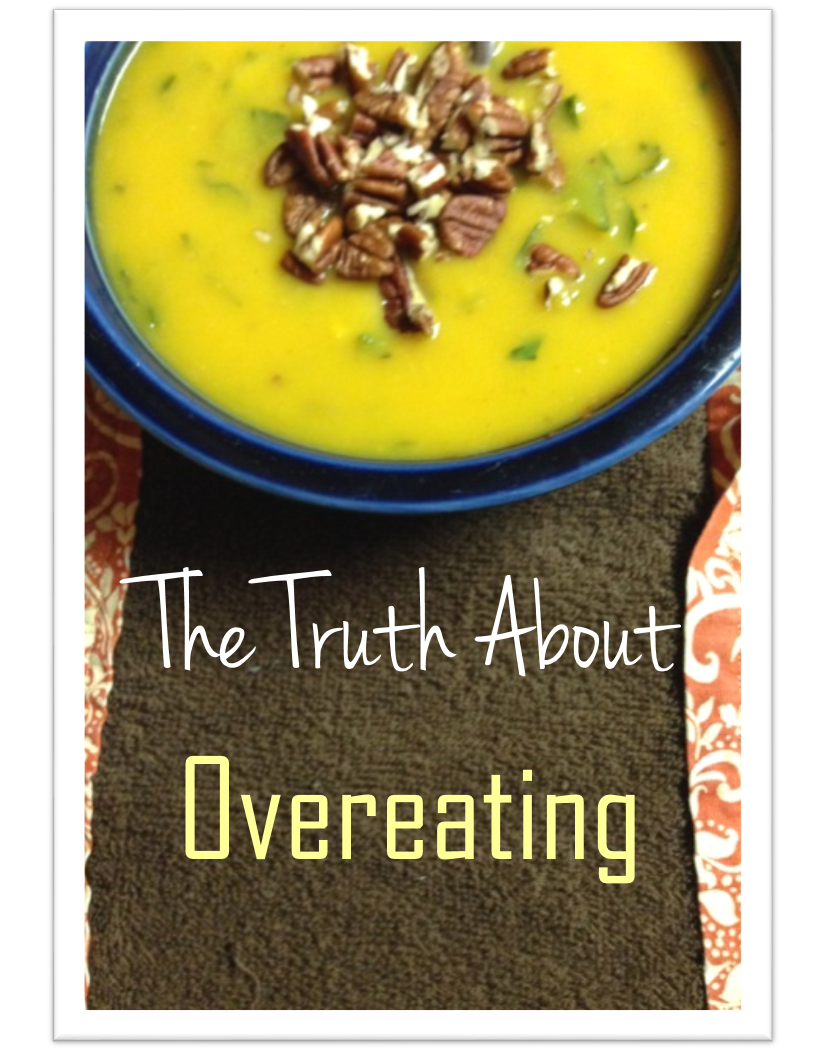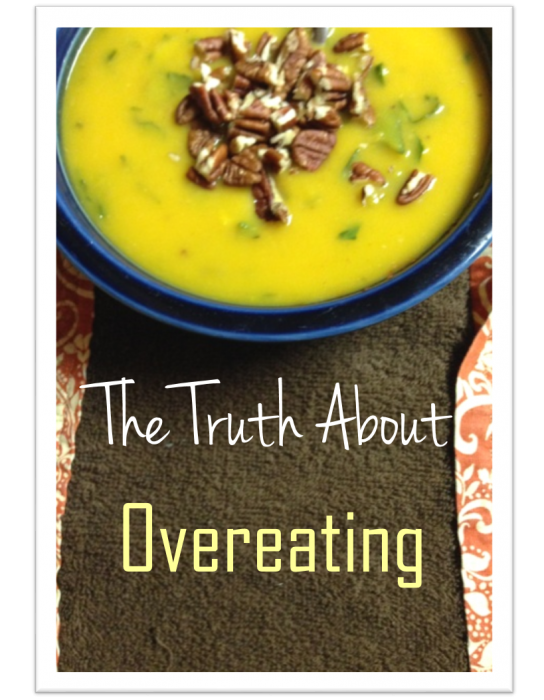
The Truth About Overeating
Today’s topic is important for all of us because, well, we all need food to survive.
Here’s a question: What’s the difference between dining versus feeding?
Hmm, let’s dig in.

We all need food to survive. Our body breaks down the nutrients in food to help our cells and organs function and keep us moving along. We have an instinctual fear of hunger, and it’s a good thing – it keeps us alive and looking for nourishment.
But in modern western culture, most of us know where our next meal is coming from. The challenge is that our instinctual fear of hunger hasn’t developed with our modern conveniences. Hence, the mayhem that occurs when you arrive home after work on an empty stomach.
Our relationship to food, and the social experience of dining, are also deeply embedded within us. It’s the reason we’re instantly “hungry” when we smell fresh baked cookies (just like mom’s house), or we get nostalgic around the holidays when our favorite dish gets passed around the table.
Food is more than just food. We feed and we dine.
So how can understanding this help us avoid overeating?
Confession: I don’t really like the terminology “avoid overeating”. The reason I don’t like it is because of the word AVOID.
One of the most pivotal books in my journey of overcoming an eating disorder was reading “Women, Food, and God” by Geneen Roth. She explains how the way we eat is linked to our core beliefs about life. When we begin to understand the way we use food to numb or distract us in life, we see how the process of eating can actually take us deeper and closer to the real truth on a spiritual level.
In other words…
It’s not about avoiding overeating, it’s about showing up to dine with the truth.
Food can be a teacher. Meal-time can be therapy. Cravings are a window to your soul. Allow what is trying to emerge to come through. The overeating thing is less about avoidance, and more about meeting our sadness, anger, anxiety, and grief head-on.
Dining Vs. Feeding
Dining is eating with a conscious awareness of what’s going on outside of us, and within us. Picture this: You’ve had a long day, you’re stressed, and hungry. You open the fridge and see left-over vegetable soup and dessert. You sit down with a warm bowl of soup, and notice how stressed out you are from work, family issues, and endless to-do’s. What comes next are a few deep breaths, a pep-talk, and a reminder to self: live life one day at a time.
Feeding is mindlessly going through the motions of eating. You’ve had the same long, stressful day at work, and you’re hungry. You get half-way through warming up the bowl of soup, but decide to pick away at the dessert while you’re waiting. What comes next? You go zone out in front of the TV while lifting spoon to mouth, eyes glazed, and your mind dazed and confused.
See the difference?
We feed the physical body to keep us alive and well. Period. Soul food, on the other hand, comes from prayer, meditation, quiet time, and long walks in the woods. The challenge arises when we try to feed our soul with an endless supply of food. It just doesn’t work. Why?
We don’t get filled where we need to be filled. We’re not filling the right hole.
The reality is that both feeding and dining can result in mindless overeating. The key is to take on the full experience of your body, life, and dinner plate – the joy and pain, excitement and sadness, happiness and grief – and dine with your discomfort.
How to Dine with Your Discomfort (aka Avoid Overeating)
Dining with your discomfort is not about sitting down with your favorite dessert when you’re depressed and confused (picture a new kind of stare down with the chocolate cake).
Here are four tips to help you start the process of changing your relationship with food, and having a more peaceful relationship with your plate.
Challenge Your Beliefs
Take a hard look at the cultural beliefs you have around food and eating. Do you believe…
It’s the holidays… why not indulge?
I don’t want to hurt anyone’s feelings, so I’ll just try a little bit of everything.
I’m sad. Where’s the sweet stuff?!
How do those beliefs influence your actions? Sometimes when we realize what’s really going on in our minds, we recognize old habits and patterns. Do you really have to believe those things anymore?
Slow Down
We’re a fast food nation, but your challenge probably isn’t avoiding the drive-thru. What you really struggle with is occasionally skipping breakfast because you’re rushing, having no time for lunch, and being famished by the time you get home for dinner. Speed is great for intervals on the track, but it’s time to take a deep breath and chew your food. See it, smell it, taste it. Bring the same conscious awareness you bring to your yoga mat, to your salad bowl. Namaste.
Ask the Question
You crave it. You eat it. You have more. At some point, ask yourself the question: Did eating that make me feel the way I thought it would make me feel? You might be surprised by the answer. I took this advice from Geneen Roth, and noticed that food didn’t always ‘hit the spot’, if you know what I mean. It was full of sugar and sweetness, but was lacking in peace and happiness. Realizing that it didn’t really serve the purpose I thought it did set me free.
Gratitude
Start a pre-meal ritual of saying thank you. Whether it’s a solo prayer or a new tradition with your family, the act of being grateful for what you’re about to eat immediately puts your heart in the right space. Picture chomping down on a pistachio before removing the shell (you’re in for some pain). Being grateful is like cracking the outer shell on your heart and enjoying what’s already waiting inside. (TWEET IT!)
Your Turn: Tell me in the comments below – What are you going to do to make peace with your plate?
 Previous Post
Previous Post Next Post
Next Post



That’s beautiful and thank you for the reminder. It seems we always need to be reminded to be more mindful. I’m trying to do just that this holiday season.
Oh, to answer your question, I’ve been more aware of portion sizes lately, as I really seem to need that to avoid overheating. And I also need the reminder to slow down and notice what I’m eating. Does it taste good? What am I truly hungry for? What do I need right now? Those are all good questions I try to ask.
thanks for your insight Lisa. GREAT questions to ask!
:))
I really enjoyed this blog!
I ask myself, do I really need it? Will it make me feel good? How will eating this benefit my health? Usually if I eat sweets I regret it afterwards… WORST feeling ever.
I’ve noticed that it is a huge challenge for me to sllooww down when I eat which is something I’m trying to work on. Portion control too!
I can relate to both dining and feeding. when I practice more yoga I am able to make more peace with my plate.
I can relate too Mike – thanks for sharing your thoughts and tips!
Thank you for this great article! I have found myself being mindful sometimes of what I eat. Lately though, I seem to just graze on my kitchen as I am home with my small child all day. I feel I have an unstoppable sugar tooth. Maybe I need to print this out and put it on my refrigerator!
That’s a great idea Haley!